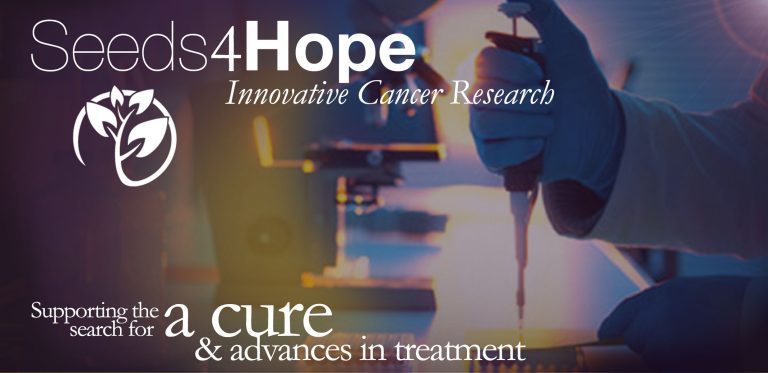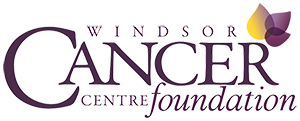Local Cancer Research
Seeds4Hope was established in 2009 as the Windsor Cancer Centre Foundation’s annual grant awards program. Seeds4Hope provides start-up funding for locally-based, new and innovative cancer research. This research, based in Windsor and Essex County, and supported by our community, brings scientists and physicians together to find better ways to prevent, detect, diagnose, and treat cancer.

To date, the Windsor Cancer Centre Foundation has provided over $2.2 million towards the funding of these grants.
Expand boxes below to learn more about grant funding and research through the years.
2021
$270,000 for Brain, Colorectal, and Lung Cancer Studies
Three grant recipients were awarded two-year grants totalling $270,000 for studies in brain, colorectal and lung cancers. Dr. Swati Kulkarni, Dr. Sabeena Misra and Dr. John Trant received their grant certificates and shared details of their research projects.
Dr. Kulkarni – to develop a brain tumour screening model to advance what we know about brain tumour biology, accelerate testing of new promising drugs and to optimize individualized therapeutic options for this aggressive cancer
Dr. Misra – to examine tumor specimens from young-onset colorectal cancer (CRC) patients and determine if there is a molecular profile that is associated with development and progression of cancer in these patients. This will help guide targeted treatment strategies and identify patients who may benefit from ongoing clinical trials
Dr. Trant – to design vaccine candidates that could provide an approach, complementary to current therapies, to improve both the quality of life and survival rates of lung cancer patients. All three projects involve multi-disciplinary research teams of clinicians and bench scientists and significantly advance the awardees research programs
“This is very exciting news! I look forward to working with the team of dedicated researchers.” (Swati Kulkarni)
“I hope that this project will provide answers that will alter the course of a cancer that has touched so many lives. This project is very close to my heart and I am thankful for this opportunity. ” (Sabeena Misra)
“I firmly believe that we will transition this funding into results that will help us to accomplish the long term research goals of our program: developing an anticancer vaccine. This will be a Seeds4Hope in the truest intent of the program!” (John Trant)
2020
Focus on Cancer Rehabilitation Services, New Treatment Options, and Protection Against Cancer
Dr. Kitty Huang
People with cancer look to rehabilitation services for strategies to cope with impairments resulting from the disease and its treatments, including changes in physical and cognitive abilities, independence and activities of daily living, and physical activity participation level. As survival rates improve, cancer rehabilitation will increasingly play a critical role in optimizing health and quality of life for survivors. Ontario continues to lack a coordinated cancer rehabilitation system despite being a strategic area of focus in Ontario Cancer Plan (OCP) IV. For those services that are available (either inpatient or outpatient), services vary widely in terms of availability, expertise, and patient access. Therefore, there are continued effort to explore and identify opportunities to improve the delivery of rehabilitation services for cancer patients.
Dr. Yufeng Tong
Working with an industry partner, this project will focus on developing better drugs for cancer treatment. There are certain enzymes and proteins in our body that we know correlate with tumour progression and poor prognosis in multiple cancers, including pancreatic ductal adenocarcinoma (PDA) and brain cancer; two malignancies with the lowest five-year survival rate. We will focus on the protein coding gene USP9X as a therapeutic target and using a combination of artificial intelligence and protein biochemistry we hope to discover novel drug candidates targeting USP9X for cancer treatment.
Dr. Andrew Swan
This project will focus on investigating novel ways to protect against cancer. Cancer research often looks to the hallmarks of cancer to find answers. Hallmarks are the defense mechanisms in our cells that when breached can lead to cancer. Research has also shown that Tuberin, a protein in our body, lies at the heart of cell and tissue growth regulation. Since two critical hallmarks of cancer are mis-regulation of growth and proliferation (a rapid multiplication of cells), understanding tuberin’s role is critical. We propose that Tuberin acts as a critical barrier to cancer growth and represents a druggable target for many human cancers.
Dr. John Trant
23,300 Canadians are expected to be diagnosed with, and 4,200 more expected to die from, prostate cancer in 2020 alone. The mortality numbers are lower than they used to be as survival has significantly improved thanks to the development of both targeted therapies and prostate cancerspecific imaging agents. Prostate cancer generally begins as hormone-sensitive adenocarcinoma (PCa), a disease treatable with androgen deprivation therapy Persistent treatment can result in the emergence of castration-resistant prostate cancer (CRPC), requiring second-generation androgen receptor-targeting agents. While initially successful, this second line of therapy often leads to the evolution of neuroendocrine prostate cancer (NEPC), characterized by aggressive androgen receptorindependent growth. It is a priority to obtain imaging tools capable of detecting disease that has progressed to NEPC as its emergence means that treatment must be modified to improve survival; prognosis becomes very poor as the tumour mutates. Unfortunately, these imaging tools do not exist.
2019
$200,000 in Research Projects
Dr. Ming Pan
Dr. Pan will be using artificial intelligence to create a program that will be able to automatically contour tumors on CT scans with the hope of improving patient care and shortening wait times.
Dr. Munir Rahim
Dr. Rahim will be seeking to understand and characterize a subset of immune cells that help against virus infections in bone marrow transplants for leukemia patients with the hope of improving patient care and recovery of bone marrow transplants.
Dr. Simon Rondeau-Gagne
Dr. Rondeau-Gagne will be developing nanomaterials which aim to deliver electric fields directly to inoperable GBM tumors in hopes that it will increase the accuracy and efficiency of treatment.
Dr. Indryas Woldie
Dr. Woldie’s work will determine the efficacy of a promising new therapy for the treatment of multiple myeloma with the aim that this cutting edge treatment may bring new hope to patients in Windsor-Essex.
Dr. Debbie Kane
Dr. Kane is aiming to increase knowledge of cancer survivors’ experiences with staying in the workforce, or returning to work and identifying best practices for cancer survivors, health care practitioners and employers with hopes of promoting cancer survivors successful return to work.
2017/18
$270,000 in Research Projects
Dr. Kulkarni
Grant Amount: $90,000
Project: To develop a brain tumour screening model to advance what we know about brain tumour biology, accelerate testing of new promising drugs and to optimize individualized therapeutic options for this aggressive cancer.
Dr. Misra
Grant Amount: $90,000
Project: To examine tumor specimens from young-onset colorectal cancer (CRC) patients and determine if there is a molecular profile that is associated with development and progression of cancer in these patients. This will help guide targeted treatment strategies and identify patients who may benefit from ongoing clinical trials.
Dr. Trant
Grant Amount: $90,000
Project: To design vaccine candidates that could provide an approach, complementary to current therapies, to improve both the quality of life and survival rates of lung cancer patients.
All three projects involve multi-disciplinary research teams of clinicians and bench scientists and significantly advance the awardees research programs
2016
$220,000+ in Research Projects
Dr. John Hudson
Grant Amount: $80,000
Project: Plk4 haploinsufficiency as a genetic predisposition for hematological malignancies.
Dr. Josée Jarry Grant Amount: $70,680
Project: Ashtanga yoga for women with breast cancer: A feasibility study.
Dr. Sindu Kanjeekal
Grant Amount: $77,236
Project: Identifying a genetic signature that predicts progression of non-invasive urothelial (bladder) carcinoma to an invasive cancer.
2015
$232,000+ in Research Projects
Dr. James Gauld
Grant Amount: $77,000
Project: Implications of select TSC2 mutations in cell division and disease progression
Dr. Phillip Karpowicz
Grant Amount: $75,125
Project: The timing of cancer: an investigation of the circadian clock and photoperiod on tumorigenesis in the APCmin mouse.
Dr. Lisa Porter
Grant Amount: $80,000
Project: Markers in the early detection of hepatocellular carcinoma.
2014
$217,000+ in Research Projects
Dr. William Crosby
Grant Amount: $66,700
Project: Systemic Profiling of SCF E3 Ligase Regulatory Attributes at Play in Cell Cycle Control and Cancer
Dr. Maher El-Masri
Grant Amount: $75,125
Project: Exploring the impact of implementing a community-based outreach and navigation cancer prevention and screening program on the uptake of cancer screening in an immigrant community.
Dr. Alioune Ngom
Grant Amount: $76,500
Project: Detecting Driver Genes and Network Biomarkers of Breast Cancer Subtypes.
Are you interested in making a donation? Click here.
